|
|
|
Sort Order |
|
|
|
Items / Page
|
|
|
|
|
|
|
| Srl | Item |
| 1 |
ID:
103230
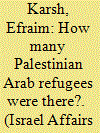

|
|
|
|
|
| Publication |
2011.
|
| Summary/Abstract |
The number of Palestinian Arabs fleeing their homes during the 1948 war has constituted one of the most intractable bones of contention of the Arab-Israeli conflict, not least since the Palestinians have insisted on the 'right of return' of these individuals and their descendants to territory that has long been part of the state of Israel. At the end of the war, the Israeli government set the number of Palestinian refugees at 550,000-600,000; the British Foreign Office leaned toward the higher end of this estimate. But within a year, as large masses of people sought to benefit from the unprecedented influx of international funds to the area, some 962,000 alleged refugees had been registered with the newly-established UN Relief and Works Agency (UNRWA). More than a half-century later, these exaggerated initial numbers have swollen still further: as of June 2000, according to UNRWA, the total had climbed close to 3.75 million, though it readily admits that the statistics are largely inflated. For its part the PLO set a still higher figure of 5 million refugees, while Israel has unofficially estimated the current number of refugees and their families at closer to 2 million. Using a wealth of declassified Arab, Israeli, and British documents, this article seeks to provide as comprehensive and accurate an estimate as possible of the actual number of refugees in the wake of the 1948 war.
|
|
|
|
|
|
|
|
|
|
|
|
|
|
|
|
| 2 |
ID:
171556


|
|
|
| 3 |
ID:
100641
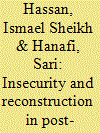

|
|
|
| 4 |
ID:
172906
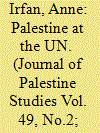

|
|
|
|
|
| Summary/Abstract |
This article examines the relationship of the Palestine Liberation Organization (PLO) to the United Nations Relief and Works Agency for Palestine Refugees in the Near East (UNRWA) during the 1970s, the period when the PLO reached the zenith of its power in Palestinian refugee camps throughout the Levant. Based on archival United Nations (UN) and UNRWA documents, as well as the PLO's own communications and publications, the article argues that the organization approached its relationship with UNRWA as part of a broader strategy to gain international legitimacy at the UN. That approach resulted in a complex set of tensions, specifically over which of the two institutions truly served and represented Palestinian refugees. In exploring these tensions, this article also demonstrates how the “question of Palestine” was in many ways an international issue.
|
|
|
|
|
|
|
|
|
|
|
|
|
|
|
|
| 5 |
ID:
164744
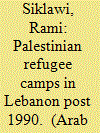

|
|
|
|
|
| Summary/Abstract |
This article addresses the issue of the Palestinian refugees in Lebanon, their camps, their resistance, and the challenges they have been facing “as refugees” to survive in the deeply divided state of Lebanon and to return to Palestine. Currently there are about 450,000 Palestinian refugees scattered among 12 official and recognized Palestinian refugee camps in Lebanon as well as many refugee gatherings; this number is part of the 6 million Palestinian refugees who are scattered in the world as a result of the establishment of the Zionist entity in 1948. However, on December 11, 1948, the United Nations General Assembly issued the UN resolution 194, during its third session, which stipulated that Palestinians have the right of return to their homes in Palestine. The Palestinian right of return is a Right and therefore it is not negotiable and cannot be compromised under any condition and/or circumstance. There have been continual attempts and proposals to terminate this Palestinian right of return to historic Palestine. To stop these toxic proposals from reaching their goals and to achieve their strategic goal, the Palestinian resistance has the legitimate right to use any means necessary, including armed struggle against the occupiers. The Palestinians in Lebanon are part of this process and they have been struggling on all levels to achieve their civil and human rights in order to improve their social and economic conditions in their refugee camps. Furthermore, the Palestinians have the legitimate right to continue their national struggle against Israel, which is the only way for the Palestinians to achieve their national goal for total liberation. However, there have been additional challenges affecting the Palestinians and their refugee camps in Lebanon post 1990; by the end of the Lebanese Civil War, the Palestinian refugee camps witnessed the emergence and growth of takfiri groups. Consequently, the Palestinian refugees have been sandwiched between oppressive Lebanese rules and the rise of the takfiris inside the camps. The article attempts to answer the following questions: What are the challenges affecting the Palestinian refugees in Lebanon? How can the Palestinians protect their identity from erasure and achieve their right of return to Palestine? Which internal and external groups currently control the camps? In what ways has takfiri ideology impacted the Palestinian identity? How can the Palestinian refugees and their camps survive under such conditions?
|
|
|
|
|
|
|
|
|
|
|
|
|
|
|
|
| 6 |
ID:
187769
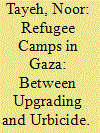

|
|
|
|
|
| Summary/Abstract |
This article examines the urban development of camps under humanitarian mandates in the context of the occupied Palestinian territories (oPt). The United Nations Relief and Works Agency for Palestine Refugees in the Near East (UNRWA) launched its Infrastructure and Camp Improvement Programme (ICIP) in 2007, with several pilot projects carried out to test this new approach. Using Gaza’s Deir El-Balah refugee camp as a case study, this article explores the contradictions inherent to development under humanitarianism and what Ilana Feldman has called “punctuations” in a chronic context of siege and infrastructure violence. That context, the article argues, perpetually sets the refugee communities back, eroding whatever capacities they were able to build up through their own collective efforts and through the aid of which they have been recipients for decades. Compounded by UNRWA’s perpetual funding shortage, the limits of development under the humanitarian umbrella within the context of a technocratic apolitical mandate become even more apparent.
|
|
|
|
|
|
|
|
|
|
|
|
|
|
|
|
| 7 |
ID:
101800


|
|
|
|
|
| Publication |
2010.
|
| Summary/Abstract |
A famous quote, 'Arab leaders don't give a damn whether the refugees live or die', attributed to an UNRWA official called 'Ralph Galloway', is examined. The real author was Lt. General Sir Alexander Galloway, who was briefly an UNRWA official in Jordan during 1951-52. Galloway's career is reviewed along with the circumstances of his brief tenure with UNRWA. He clashed with the Jordanian government over control of the organization during a period of economic crisis and was eventually fired at their request. Galloway's statement was made to visiting American clergy but Zionist writers recopying earlier sources lost Galloway's identity. The historiography of the quote is discussed along with the implications of Galloway's true identity for understanding the history of UNRWA.
|
|
|
|
|
|
|
|
|
|
|
|
|
|
|
|
| 8 |
ID:
100639
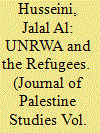

|
|
|
|
|
| Publication |
2010.
|
| Summary/Abstract |
Over the last sixty years, UNRWA's relationship to the Palestinian refugees it serves has undergone profound changes. Faced with the difficult task of adapting a humanitarian regime to a highly politicized environment, the agency has had to thread its way through the diverse and sometimes conflicting expectations of the international donor states, the Arab host countries, and the refugees themselves, who from the start were deeply suspicious of UNRWA's mandate as inimical to the right of return. Against this background, the article traces the evolution of the agency's role from service and relief provider to virtual mouthpiece for the refugees on the international stage and, on an administrative level, from a disciplinary regime to emphasis on community participation and finally to the embrace of a developmental agenda. Although UNRWA's presence, originally seen as temporary, seems likely to endure, the article argues that financial and political constraints are likely to thwart its new agenda.
|
|
|
|
|
|
|
|
|
|
|
|
|
|
|
|
| 9 |
ID:
111232


|
|
|
|
|
| Publication |
2012.
|
| Summary/Abstract |
UNRWA's reconstruction of Jenin refugee camp following the massive destruction by Israel in April 2002 was the largest humanitarian intervention during the second intifada. This article uses the Jenin project as a lens through which to critically examine the minimalist humanitarian paradigm underwriting the agency's relief-centered mandate. Reviewing the negotiations between UNRWA planners and local refugee committees, the author highlights the tension between the agency's politically "neutral" technical vision and the refugees' needs and wishes. While recognizing UNRWA's crucial role, the author regrets that in expanding its operations beyond relief provision, the agency opted for a more traditional (liberal) community-based development framework rather than a rights-based approach, resulting in a depoliticization that undermines the community's struggle for its rights.
|
|
|
|
|
|
|
|
|
|
|
|
|
|
|
|
|
|
|
|
|